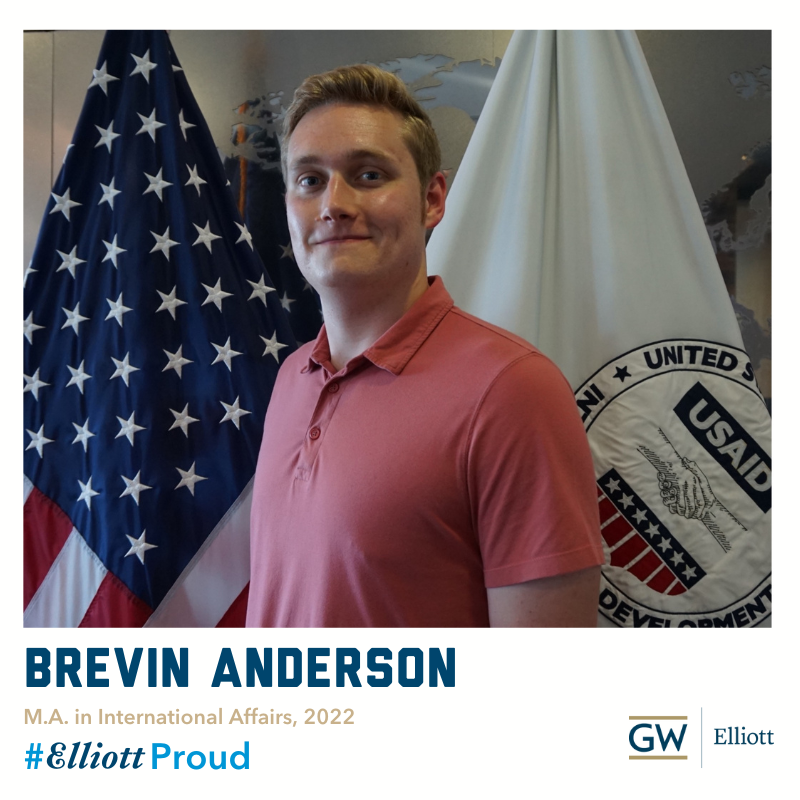#ElliottProud: Brevin Anderson

Brevin Anderson is a Management and Integration Specialist for the Office of Asia, Latin America, and the Caribbean (ALAC) in the Bureau for Humanitarian Assistance (BHA) at United States Office for International Development (USAID), providing office-wide program support. He holds an M.A. in International Affairs with a concentration in International Economic Affairs from George Washington University’s Elliott School and B.A.s in Political Science and English from Seattle Pacific University. He has studied in Arusha, Tanzania and Oxford, England, and has recently returned from working in Thailand. Brevin has previously worked as a program assistant in the Sudans Division at BHA, a data manager at Northeastern University, and as a deputy editor at the Journal of Greater Mekong Studies.
What is your current position? What have you learned since you began?
I work as a Management and Integration Specialist in the Office of Asia, Latin America, and the Caribbean in the Bureau for Humanitarian Assistance at USAID. My role is to provide program support to all our ALAC geographic teams, which means troubleshooting new and unique situations, incidents, and conflicts that arise during our humanitarian programming.
In addition to learning the granular details of BHA’s federal procurement policies and application requirements, I’ve had the privilege of encountering the breadth and depth of USAID’s essential humanitarian work, as well as the courage and commitment of our many NGO and UN partners who work in some of the most challenging countries in the world like Afghanistan and Sudan.
What professional organization, websites, or events would you recommend for students interested in your field, and why?
I found my way to USAID through a Devex job posting, but USAID is prolific on LinkedIn and Twitter with information, job and partnership opportunities, and hiring fairs. And of course, set up alerts for USAJobs.gov and BHAJobs.
I also recommend staying on top of current events. One thing that surprised me is that USAID leadership and Congress read and react to the same news that we do. Articles from the New York Times, Washington Post, BBC, Devex, and the New Humanitarian are passed around the office all the time for information and comment.
What was the most valuable thing you learned during your time at the Elliott School?
The two most valuable things I came to understand at the Elliott School were the gap between academic development work and day-to-day operations, and the many bridges that can connect them. Learning from professor-practitioners in both government and NGO roles, taking skills courses tailored to practical application, and completing the Capstone project all highlighted the parallel worlds GW teaches you to connect.
What part of your career do you find most challenging and how do you stay motivated?
BHA focuses on humanitarian interventions around the world, and lifesaving response work can never happen too quickly. Government work of any kind is tedious, slow, and complicated, but someone has to do it. I stay motivated because at the end of the day, if I do my job well, I could move the wheat shipment delivery up a day, communicate the green light for a new clinic location, or help an NGO start their nutrition program on time.
What is your favorite memory from your time at the Elliott School?
My favorite memory is from my first semester. I went to an outdoor social-distanced meet up of new students in someone’s backyard. Classes had started, but I had yet to meet anyone in-person. Hearing the plans and aspirations of my fellow students let the reality of the Elliott School sink in—and several people at that meet-up would become friends. Also, someone brought bacon-wrapped jalapeño poppers to share.
If someone wrote a book about you 10 years from now, what would it be called?
The Man Who Played Too Many Board Games: A Cautionary True Tale
“Want to connect with current Elliott School students and alumni? Click here to see how!
Find out more about this program by creating a CustomViewbook!
Join us for an information session, RSVP here!
Click here to apply to the Elliott School!
The #ElliottProud profile series is managed by the Elliott School Office of Graduate Admissions and highlights graduate program alumni to answer common questions posed by prospective, incoming, and current students. For more information on this series or to submit questions, e-mail the Office of Graduate Admissions at esiagrad@gwu.edu.
The views expressed by students profiled do not necessarily represent those of organizations they work for, are affiliated with, or the Elliott School of International Affairs.”

